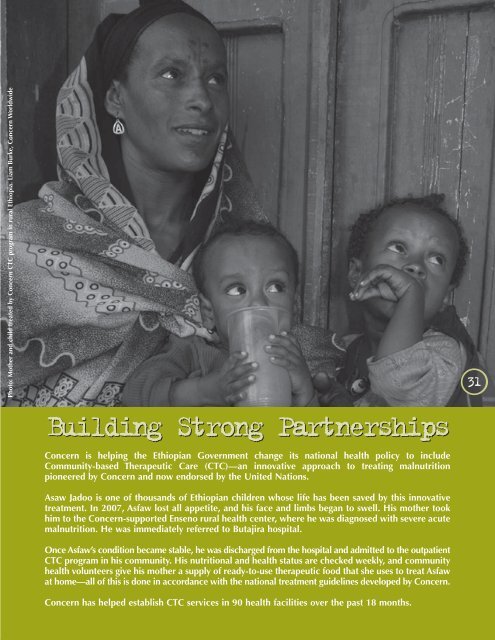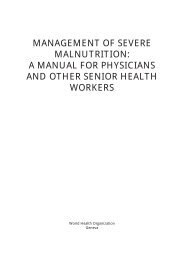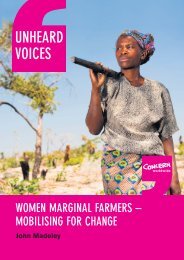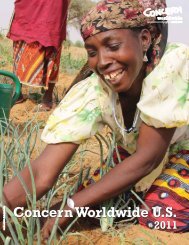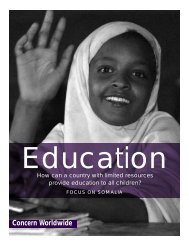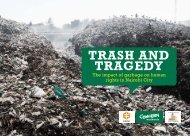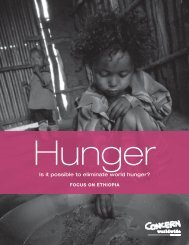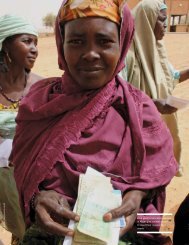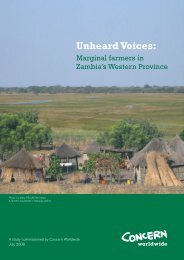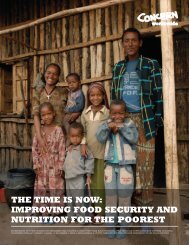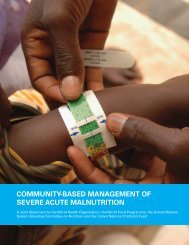Building Strong Partnerships - Concern Worldwide
Building Strong Partnerships - Concern Worldwide
Building Strong Partnerships - Concern Worldwide
Create successful ePaper yourself
Turn your PDF publications into a flip-book with our unique Google optimized e-Paper software.
Photo: Mother and child treated by <strong>Concern</strong> CTC program in rural Ethiopia. Liam Burke, <strong>Concern</strong> <strong>Worldwide</strong>31<strong>Building</strong> <strong>Strong</strong> <strong>Partnerships</strong><strong>Concern</strong> is helping the Ethiopian Government change its national health policy to includeCommunity-based Therapeutic Care (CTC)—an innovative approach to treating malnutritionpioneered by <strong>Concern</strong> and now endorsed by the United Nations.Asaw Jadoo is one of thousands of Ethiopian children whose life has been saved by this innovativetreatment. In 2007, Asfaw lost all appetite, and his face and limbs began to swell. His mother tookhim to the <strong>Concern</strong>-supported Enseno rural health center, where he was diagnosed with severe acutemalnutrition. He was immediately referred to Butajira hospital.Once Asfaw’s condition became stable, he was discharged from the hospital and admitted to the outpatientCTC program in his community. His nutritional and health status are checked weekly, and communityhealth volunteers give his mother a supply of ready-to-use therapeutic food that she uses to treat Asfawat home—all of this is done in accordance with the national treatment guidelines developed by <strong>Concern</strong>.<strong>Concern</strong> has helped establish CTC services in 90 health facilities over the past 18 months.
MalawiMalawi is one of the poorest countries in the world, ranked at 164 out of 177 countries in theUnited Nations Human Development Index. Sixty-five percent live below the poverty line andover one quarter of the country does not have access to clean water. Food shortages are a massiveproblem in Malawi, where 22 percent of children are underweight for their age. Continuedwrangling between political opponents has stalled reforms and has left the government unable totake advantage of increased income from recent exploitation of uranium reserves.32<strong>Concern</strong> has been working inMalawi since 2002, focusing onnutrition, livelihoods and emergencyresponse.HEALTH—Implementing CommunitybasedTherapeutic Care on a nationalscaleIn 2007, <strong>Concern</strong> continued to work withthe Ministry of Health to expand its innovativeCommunity-based TherapeuticCare (CTC) approach to malnutrition. Targetingmalnourished children under five,CTC brings the treatment to the childrenin their villages, rather than requiringthem to walk or be transported miles toreach a centralized treatment facility.Trained community volunteers identifymalnourished children and refer them tothe community-based treatment programat centers distributed throughout theprogram area. Children with uncomplicatedacute malnutrition are providedwith weekly outpatient medical treatmentand one week’s supply of therapeutic foodto take home. Those with complicatedacute malnutrition are referred to a clinicfor inpatient treatment. In all cases,mothers receive health education, andentire families benefit.implementing CTC, and assisting eightdistricts in planning and launching CTC.2007 also saw an expansion of theapproach to people living with HIV&AIDS.LIVELIHOODS—Working to alleviatepoverty for 30,000 householdsIn 2007, <strong>Concern</strong> launched a comprehensivenew rights-based livelihoods programtargeting 30,000 poor households. Theprogram aims to address the root causesof poverty by focusing on raising communityawareness about peoples’ rights andresponsibilities; addressing inequalitiesand social injustice in local traditions andcultures; reducing stigma and marginalizationof people living with HIV&AIDS;increasing participation of poor in localdevelopment; and improving growth andeffectiveness of local government and civilsociety structures. An additional componentaims to improve people’s methods ofearning income, and improve social protectionsfor the extreme poor.Key accomplishments in 2007 includedthe integration of CTC and nutrition interventionsinto the livelihoods program atthe community level, and the establishmentof rural community banking servicesin Dowa, which enrolled 1,150 clients inthe first four months.and were linked to local market prices.In 2006, <strong>Concern</strong> had also partnered withthe Ministry of Health to implement CTCactivities to treat malnourished childrenunder five. DECT’s success was in largepart measured by a significant reductionin the number of children admitted tothe program’s outpatient treatment andnutritional rehabilitation units. DECTconcluded in 2007 after reaching 10,000households, but will remain a usefulmodel for effective response to futurefood emergencies.ZAMBIANkhotakota •Lilongwe ••DowaTANZANIALakeMalawiMOZAMBIQUEMALAWI•NsanjeCTC’s marked impact on reducing morbidityand mortality has been recognizednot only in <strong>Concern</strong>’s four programareas—Lilongwe, Nsanje, Dowa andNkhotakota—but by national health staff.<strong>Concern</strong> has assisted the Ministry ofHealth to incorporate CTC into the essentialhealth package (EHP), making itnational policy. In 2007, the CTC AdvisoryService (CAS) was established toenhance the effectiveness and coverage ofCTC in Malawi, and to build the capacityof national and district-level health staff tofully manage CTC within the primaryhealth care system. <strong>Concern</strong> worked withCAS and the District Health Offices, providingtraining, technical support andmentoring to 12 districts that were alreadyEMERGENCY—Using an innovativecash transfer system to help 10,000families through a food emergencyIn 2007, <strong>Concern</strong> continued to implementthe Dowa Emergency Cash Transfer(DECT) Program. A devastating combinationof floods and drought in 2005 led toa severe food shortage throughout 2006.In response, <strong>Concern</strong> pioneered an innovativeemergency cash transfer programutilizing smart cards and mobile banks.The extension of aid through cash transfersas opposed to food handouts empoweredpeople to address their most pressingneeds, and helped to rebuild the shatteredlocal economy. Monthly payments weredetermined based on household size,Area: 118,000 sq kmPopulation: 13.2 millionGDP per capita: $667Infant mortality rate(per 1,000 births): 79Life expectancy: 46.3Living with HIV & AIDS: 14.1%Literacy rate: 64.1%Access to safe water: 73%Human development rank: 164
Mozambique2007 was another bad year for natural disasters in Mozambique. More than 50,000 families wereaffected by flooding, while the south of the country suffered its third drought in five years. CycloneFavio destroyed the crops of more than 50,000 households. This is a difficult burden for a countrythat is already incredibly poor: Mozambique ranks 172 out of 177 countries in the United NationsHuman Development Index. Over one-third of the country live on less than $1 per day and overhalf lack access to clean water.<strong>Concern</strong> has been workingin Mozambique since 1984and is implementing livelihoods,emergency, educationand HIV&AIDS programs.EDUCATION—Providing accessand quality to 59,874 children andfamily membersIn 2007, <strong>Concern</strong> was working in schoolsacross poor and often remote communitiesin Nampula, Manica and Zambeziaprovinces, guided by the MillenniumDevelopment Goals of universal access toeducation and the elimination of genderdisparity in education. An in-depth evaluationfound that <strong>Concern</strong> was successfullybuilding the capacity of 123 school councils,which give each community ownershipof the projects. <strong>Concern</strong> worked withthe councils to manage construction ofclassrooms and boarding facilities usinglocal materials, develop school gardensand orchards, and establish schoolfeeding programs. The evaluation alsofound increased awareness regardingchild rights and HIV&AIDS, increasedattendance, and decreased dropout rates,especially among girls. <strong>Concern</strong> workedwith education district staff to providein-service teacher-training, and supervisionand support to the government-run distancelearning course, which in 2007 reached50 percent of schools in operational districts.In all, 59,874 people benefited directlyfrom the education program.LIVELIHOODS—Helping the rural poorgain access to resources andparticipate in planning<strong>Concern</strong> worked in remote rural areas ofNampula and Manica provinces to helppoor people gain more access and controlover resources and decision-makingprocesses that are affecting their lives.<strong>Concern</strong> supported local NGOs andcommunity-based organizations in promotingagricultural diversification, localtrade and livestock management. As thegovernment of Mozambique decentralized,distributing more authority to provincialgovernments, <strong>Concern</strong> mobilized peopleto prepare and participate in local consultativeprocesses linked to decentralizationand district planning. Direct beneficiariesincluded 2,372 people and 46 communitybasedorganizations.HIV&AIDS—Improving care andeducation for 5,000 people<strong>Concern</strong> Mozambique’s HIV&AIDSprogram works with community leaders,community-based organizations andadolescents in Zambezia Province toimprove HIV&AIDS care, prevention andpositive living. It has started to addresssensitive issues, touching on unequalgender relations, cultural taboos, healthseekingbehavior and beliefs and the powerof local traditional healers, stigma, andhousehold dynamics. In 2007, <strong>Concern</strong>also implemented direct HIV interventionson a small scale in Manica Province,after learning that knowledge aboutHIV&AIDS was limited among victims ofthe Zambezi floods. The two programsreached 150 activists and communityleaders and 5,000 vulnerable people.EMERGENCY—Responding tothe needs of 29,319 of the mostvulnerable peopleIn response to flooding caused by excessiverainfall in the Shire and Zambezi riverbasins in central Mozambique in January2007, <strong>Concern</strong> joined a multi-agencyeffort led by the UN and the government’sNational Institute for Disaster Management(INGC). 150,000 people wereaffected, and <strong>Concern</strong> quickly went intoaction in Zambezia and Manica provinces.<strong>Concern</strong>’s efforts focused on providingsufficient education facilities for schoolagechildren; providing clothes andblankets to 1,200 children; distributionof food and other non-food items; andreducing the spread and impact ofHIV&AIDS. In all, 12,000 people benefitedfrom <strong>Concern</strong>’s educational support,which included school materials, desksand benches. 6,630 people received food,clothes, blankets and soap. <strong>Concern</strong> alsoinitiated a disaster risk reduction componentto the response, working with partnersand the INGC to train disaster managementcommittees and to pre-position adequatestocks of food and non-food items for thenext flood season.ZAMBIAZIMBABWESOUTHAFRICATANZANIAMALAWIMOZAMBIQUE•MaputoArea: 801,590 sq kmPopulation: 20.5 millionGDP per capita: $1,242Infant mortality rate(per 1,000 births): 100Life expectancy: 42.8Living with HIV & AIDS: 16.1%Literacy rate: 38.7%Access to safe water: 43%Human development rank: 172•Nampula33
NepalDespite an agreement between the main parties, political turmoil and violence still dominatethe agenda in Nepal. Ranking 142nd out of 177 countries in the United Nations HumanDevelopment Index, nearly half of children under five in Nepal are underweight for their age andone quarter of the population live on less than $1 per day.34<strong>Concern</strong> has been working inthe poorest regions of Nepalsince 2006 and is implementinglivelihoods, water and sanitationand nutrition programs.HEALTH—Preventing disease amongthe most vulnerable by providing safedrinking water and sanitation<strong>Concern</strong> is working at the communitylevel in the remote and extremely poordistricts of Jumla, Mugu, Dailekh andJajarkot to prevent the spread of waterbornediseases by providing safe drinkingwater and sanitation facilities to more that7,500 people. Each year, approximately15,000 Nepalese children die beforereaching their fifth birthday due to waterrelateddiseases and poor sanitation, sothis is a lifesaving intervention.People spend less time collecting water,allowing them to focus on childcare,kitchen gardening and attending school,etc. Working with a local partner NGOand Village Development Committees(VDCs) in each target village, <strong>Concern</strong>mobilizes the community to assist inplanning and construction. The new infrastructurehas been supported by healthand hygiene promotion, including anewsletter reaching 45,000 readers anda radio program reaching 70,000 listeners.Climate and other natural factors delayedsome of the work, but <strong>Concern</strong> hascompleted 197 water points, 2,523household latrines, and nine schoollatrines across 14 communities.LIVELIHOODS—Meeting urgent foodneeds while improving infrastructureand livelihood skillsThe Protecting Livelihoods in Crises (PLIC)was launched in 2006 with the objectivesof protecting the livelihoods of communitiesin crisis with unstable food suppliesthrough Food for Work (FfW) and Food forTraining (FfT) programs. In 2007, PLICwas rolled out in Rukum, Achham andBajhang Districts. Each participating communitymember received four kilos of ricefor an eight hour working day. Householdswith up to eight members were entitledto send one person for work.Households with more than eight memberscould send a second person, and receivemore food. FfW involved projects identifiedby the communities themselves aspriorities, for example improving foottrails, rehabilitation of schools, drinkingwater projects, surface irrigation programs,reclamation of terraces, etc. FfT coveredareas such as HIV/AIDS awareness,kitchen gardening, livestock development,orchard development, and goatrearing. With assistance from co-fundersWorld Food Program (WFP) and UNICEF,570,072 metric tons of rice were distributedunder PLIC in 2007. 13,938 peoplereceived not only food aid, but also thebenefits of 127 new infrastructure projectsand 49 training and support projects.Bajura • • Jumla CHINASurkhet • NEPAL• KathmanduINDIAArea: 147,200 sq kmPopulation: 27.1 millionGDP per capita: $1,550Infant mortality rate(per 1,000 births): 56Life expectancy: 62.6Living with HIV & AIDS: 0.5%Literacy rate: 48.6%Access to safe water: 90%Human development rank: 142
Photo: Schoolchildren, Haiti, <strong>Concern</strong> <strong>Worldwide</strong>35Promoting Health in SchoolsBefore becoming involved in <strong>Concern</strong>’s Schools Health Program, Sainte Clair primary school, in Sautd’Eau, Haiti, there was no access to clean water, and no latrine or sanitary facilities. VirgileEmmanuel, the school principal, explains, “Teaching was very difficult during those years before<strong>Concern</strong> got involved. There were many absences of both students and teachers, mainly due toillness. We had no education on hygiene issues and no access to clean water. My students would walkfor miles to reach the school each morning on an empty stomach, and so lack of concentration wasan issue too.”<strong>Concern</strong> constructed latrines, provided safe, clean drinking water, and supplied teaching materialsshowing the importance of hand washing and other hygienic practices—all benefiting Sainte Clair’s680 students and seven teachers. Said Emmanuel, “I have seen an immense improvement within theschool as well as students’ attendance which I now monitor each morning by doing a role call.<strong>Concern</strong> introduced this element too so that we can track students’ progress. <strong>Concern</strong> also gave usfirst aid kits and medicines to rid the children of ringworm and other treatable diseases which beforewould have made them very ill and therefore cause them to neglect their school work.”
PakistanIt was a turbulent year for Pakistan in terms of both politics and security. Demonstrations andbombings throughout the year led to President Musharraf declaring a State of Emergency inNovember. Cyclone Yemyin hit the south in June, bringing with it devastating floods which lefthundreds dead and hundreds of thousands homeless. With inflation and interest rising andeconomic growth declining, over 70 percent of the country live on less than $2 per day.36<strong>Concern</strong> has been working inPakistan since 2001 and is implementinglivelihoods, health careand emergency response andpreparedness programs.HEALTH—Increasing access toclean water and improving primaryhealth care for 71,533 peopleIn partnership with its local NGO partners,<strong>Concern</strong> is active in water & sanitationand primary health care across Pakistan.In Awaran, Balochistan Province, the constructionof hand pumps and windmillpoweredwater pumps in 2007 broughtclean drinking water to at least 5,000people (3.5 percent of the district’s population).In the North West Frontier Province(NWFP), the construction and rehabilitationof water supply systems and householdlatrines has impacted the health of approximately40,000 people, also lessening theburden on women, who no longer have totransport water over long distances. Inrural Rawalpindi, the construction of eightgravity flow water supply sand distributionsystems directly benefited over 4,500people. In all, 65,613 people benefitedfrom <strong>Concern</strong>’s water and sanitation work.<strong>Concern</strong>’s training and equipping of traditionalbirth attendants (TBAs) has resultedin improved care for women at the communitylevel, and provided incomeopportunities for the TBAs themselves. InBalochistan alone, it is estimated that trainingof TBAs will result in 3,000 to 5,000safer births over the coming years. Inunderserved rural and urban areas, healthcamps and drop-in centers provided vitalcare, including health screenings, first aidand vaccinations to 5,920 people.<strong>Concern</strong>’s advocacy efforts, whichincluded the establishment of grassrootsCommunity Organizations (COs) createdopportunities for communities to engagewith government representatives andthe health department to express theirIRANAFGHANISTANRawalpindi •IslambadQuetta •PAKISTANArabian SeaCHINAINDIAhealth-related priorities and concerns.These efforts led directly to hepatitis, polio,and measles vaccination programs inQuetta, and the improvement of sewageand waste removal systems in Rawalpindiand Quetta.LIVELIHOODS—Enhancing potentialfor the poorest in rural and urbanareasAcross Pakistan, <strong>Concern</strong> worked toachieve environmentally sustainableincreases in agricultural and non-agriculturalproduction, and better access tosecure and adequate food sources. InNWFP, <strong>Concern</strong> continued to implement acomprehensive program aimed at helpingre-establish stability among victims of themassive 2005 earthquake. There was significantprogress in the repair of irrigationchannels, land rehabilitation, establishmentof fruit orchards, distribution of seedsand tools, distribution of livestock, animalhealth and livestock management activities,and grants towards the rehabilitation ofsmall enterprises. The repair of earthquakedamagedroads, bridges and foot pathsrestored access to markets and essentialservices such as health care and education.In Punjab and Balochistan, <strong>Concern</strong> isimplementing both rural and urban developmentprograms. Working with localpartners, <strong>Concern</strong> offers vocational andsmall enterprise training, as well asmatching grants to community members.<strong>Concern</strong> also distributed fuel-efficientstoves and constructed bio-gas plants,which generate fuel for cooking, lightingand heating. By reducing the need for firewood,these innovations slow deforestation.EMERGENCY—Meeting basic survivalneeds for 67,360 peopleIn June 2007, Cyclone Yemyin hit the southof Pakistan, bringing with it devastatingfloods which left hundreds dead andhundreds of thousands of people homeless.<strong>Concern</strong>’s response was centered inBalochistan province, working with localpartners to provide food and non-foodrelief supplies. Upon the completion ofthe emergency response in early August,<strong>Concern</strong> designed a six-month post-flood,early recovery project for the affectedcommunities; activities included reconstructionof 400 traditional shelters andraising of homes above flood levels, rehabilitationof irrigation systems, distributionof seeds, reclamation of land, rehabilitationof tube wells and hand pumps, andconstruction of flood protection structures.Earlier, in May 2007, <strong>Concern</strong> completeda similar post-flood recovery project foraffected families in Sindh province, whichhad experienced major flooding in 2006.In both cases, <strong>Concern</strong> conducted disasterrisk reduction training in anticipation offuture emergencies.Area: 804,000 sq kmPopulation: 158.1 millionGDP per capita: $2,370Infant mortality rate(per 1,000 births): 79Life expectancy: 64.6Living with HIV & AIDS: 0.1%Literacy rate: 49.9%Access to safe water: 91%Human development rank: 136
RwandaRwanda’s overall political security situation remained stable in 2007, and the economy experiencedgrowth of six percent. However, the country still faces major challenges in agriculture, populationgrowth, and income distribution.<strong>Concern</strong> has been working inRwanda since 1994. Over 60percent of the country live on lessthan $1 per day and one in fivechildren is underweight. During2007, <strong>Concern</strong>’s work focusedon livelihoods, child health andeducation. <strong>Concern</strong> works inpartnership with governmentauthorities and civil society.CHILD SURVIVAL—Saving livesthrough community-based careThe goal of <strong>Concern</strong>’s Expanded ImpactChild Survival Program is to reduce childmortality in six underserved districts byaddressing the three leading direct causesof death in children under five: malaria,diarrhea, and pneumonia. The currentprogram aims to cover one fifth of thecountry. At its heart is a network of communityhealth workers (CHWs) whoreceive training and support from<strong>Concern</strong>, its partner NGOs, and districthealth staff. They bring life-saving screening,treatment and referral services to childrenand their mothers, where in the pastthey may have been required to travel todistant health centers.In 2007 4,452 Community HealthWorkers were elected to implement theprogram in the four new districts. Theyprovided screening, treatment and referralservices to 73,357 children with fever in2007, of whom 90 percent were treatedwithin 24 hours.COMMUNITY THERAPEUTIC CARE(CTC) PILOT PROJECT—Rolling outan innovative approach to treatingmalnutritionAlso in 2007, <strong>Concern</strong> launched a pilotCommunity-based Therapeutic Care (CTC)program based out of Gikore and Kibayihealth centers and Kibilizi Hospital.Targeting malnourished children under five,CTC brings the treatment to the childrenin their villages, rather than requiringthem to walk miles to reach a centralizedtreatment facility. Trained communityvolunteers identify malnourished childrenand refer them to the community-basedtreatment program at centers throughoutthe program area. In 2007, 91 childrenunder five were treated for severe acutemalnutrition and complications such asmalaria, respiratory infections, skin infections,tuberculosis, and HIV&AIDS. Amongthese cases, the cure rate for severe acutemalnutrition was 93 percent. Thirty-twodistrict health staff were trained in treatmentof severe acute malnutrition, as wellas supervision and monitoring of theprogram. 51 villages (approximately 35,000people) benefited from health, nutritionand hygiene education provided bytrained community health workers. Resultsfrom this pilot are being shared with theMinistry of Public Health for the purposeof revising national guidelines and policyon severe acute malnutrition.LIVELIHOODS—Enhancing foodsecurity and helping the poorestearn income<strong>Concern</strong> is targeting the districts of Rwandawhere families are least able to rely onstable, quality food supplies. In 2007,new livelihoods programs were launchedDR CONGOLakeKivuUGANDA• Musanze• Kigali CityRWANDA• HuyeTANZANIABURUNDIin Musanze and Huye Districts. <strong>Concern</strong>assisted small farmers in integrating newor improved varieties of crops into thefarming systems, provided seeds andtools, and introduced homestead gardens.270 households were trained in agrotechniquesincluding: Soil assessment;crop rotation; adequate soil preparationtechniques; combating pests; and seedselection. <strong>Concern</strong> also targeted 270 vulnerable,mostly landless, households formicro-enterprise training, in trades rangingfrom traditional local crafts (e.g. basketmaking)to more innovative possibilities(e.g. honey making, batik printing, tailoring,repairing cell phones and radios).HIV&AIDS—Improving the lives of24,710 people living with HIV&AIDS<strong>Concern</strong> is working to reduce the transmissionof HIV and to minimize theimpact of AIDS in Gakenke, Huye andNyaruguru districts, which together havean estimated 24,710 people living withHIV&AIDS. The direct beneficiaries arepeople living with HIV&AIDS, widows,orphans and vulnerable children. <strong>Concern</strong>’scommunity-based program mobilizedanti-AIDS clubs, trained peer counselors,trained health center staff in voluntarytesting and counseling, and identified 240households to participate in food productionand small business training.Area: 23,000 sq kmPopulation: 9.2 millionGDP per capita: $1,206Infant mortality rate(per 1,000 births): 118Life expectancy: 45.2Living with HIV & AIDS: 3.1%Literacy rate: 64.9%Access to safe water: 74%Human development rank: 16137
SomaliaSomalia experienced a devastating combination of continuing political unrest and natural disastersin 2007. Somali security forces backed by Ethiopian troops continued fierce fighting againstinsurgents which resulted in massive displacement from the capital, Mogadishu. Unfortunately,these people have fled into the lower Shabelle region, which continues to experience severedrought. Somalia is one of the poorest and most underdeveloped countries in the world, where17 percent of children are malnourished. Only 28 percent of the country has access to clean water.38<strong>Concern</strong> has been working inSomalia since 1986.EDUCATION—Improving the qualityof education in 21 schools“Strengthening Child Opportunities forPrimary Education” (SCOPE) is <strong>Concern</strong>’scommunity-managed primary educationproject in Mogadishu and the LowerShabelle Region. In 2007, 8,313 pupils(of which 37 percent are girls) attendedprimary school, and 264 teachers receivedincentives. 22 school buildings wererepaired or rebuilt, wells were repaired attwo schools, and 42,000 textbooks weredistributed along with benches and desks.Additionally, 190 Community EducationCommittee members were trained in themanagement of their community schools.Of 7,564 students (between grades oneto seven) who took final exams in theacademic school year, 96 percent passedwith above-average marks.LIVELIHOODS—Increasing income andaccess to food among the rural poorOver 2,500 families benefited fromincreased crop production thanks to 48 kmof rehabilitated irrigation canals, whichfed 6,140 hectares of farmland plantedwith new seed varieties. A cash-for-workcomponent created short employmentopportunities for workers representing1,920 poor families in 2 districts. NewFarmer Field Schools offered training anddemonstrations in the potential of cropssuch as garlic and Irish potato. Theprogram targets over 16,000 poor familiesin the region and will expand in thecoming years.WATER & SANITATION—Improvinghealth and access to clean water for4,256 families<strong>Concern</strong> is implementing a communitybasedprogram in Lower Shabelle. In 2007,the program reached 4,256 families throughthe construction or rehabilitation of handdugwells, empowerment of communitywater and environmental sanitation committees,the construction of pit latrines,technical training and distribution of tools,and public education campaigns. In mostof the villages the time required to fetchwater was reduced from 4–5 hours to lessthan 10 minutes. There was also a markedreduction in the number of people usingwater from contaminated sources and theprevalence of waterborne/related diseases.Water consumption increased from20/30 liters to 80 liters per family per day.HIV&AIDS—Raising awareness andreducing stigmaIn Mogadishu, <strong>Concern</strong> worked to minimizethe prevalence of HIV&AIDS byincreasing knowledge through communityawareness campaigns, and training of staffand community. The program also soughtto reduce fear, denial and stigma, and toimprove public understanding of the risksand effective prevention of HIV&AIDS. 24training workshops brought together 600people representing various civil societygroups to pass on learning to othermembers of the community.ETHIOPIAKENYASOMALIAIndianOcean• MogadishuPOSITIVE ATTITUDES FOR LIFE—Offering hope to some of the most atriskchildrenThe “Positive Attitude for Life” (PAL)program offers vulnerable children inMogadishu alternatives to violence bycreating educational and recreationalopportunities. Targeted children are ableto access formal and non-formal education,vocational skills training, familyreunification and child advocacy, psychosocialsupport, and recreation andsporting activities. In 2007, 510 childrenparticipated. The project also reunited 21out of 33 street children with their families.EMERGENCY—Meeting the criticalneeds of people affected by droughtand conflictAs a result of recurrent droughts andcontinued armed conflicts, communitiesin southern Somalia faced a severe crisis.A drought recovery project expanded in2007 to support an additional 24,935families, with the provision of emergencysupplies, water trucking, cash for work andrehabilitation of water sources. The projectwas further extended until August 2008 tosupport an additional 17,000 beneficiariesin Baidoa and Berdaale Districts.In response to the immense humanitarianneeds of the 600,000 people displaced byviolence in Mogadishu, <strong>Concern</strong> launchedemergency programs in two regions. InGalgaduud, 5,400 families benefited fromthe rehabilitation of rainwater catchmentsand shallow wells, along with cash-forworkprograms. In Mogadishu and LowerShabelle, household kits were distributedto 8,899 families, with 1,250 blankets and50 mosquito nets going to five hospitals.Area: 638,000 sq kmPopulation: 8.2 millionGDP per capita: N/AInfant mortality rate(per 1,000 births): 133Life expectancy: 47.1Living with HIV & AIDS: N/ALiteracy rate: N/AAccess to safe water: 29%Human development rank: N/A
Photo: Dominic MacSorley, Democratic Republic of Congo, <strong>Concern</strong> <strong>Worldwide</strong>39This is KembaHe is five years old. He survived four years of war. Kemba lives in an impoverished, remote area inthe Democratic Republic of Congo (DRC). His village was burned to the ground in clashes between therebels and the military. Everything was destroyed. Kemba and his family were forced to flee, and had tohide in the forest for months. Kemba survived on wild berries and whatever food they could find. As theconflict intensified, more than 60 villages were destroyed, and over 160,000 people were made homeless.The once poor but peaceful area where Kemba lived became known as the “Triangle of Death.”Now, the fighting has ended, and Kemba’s family and others have returned to their villages. <strong>Concern</strong> hasbeen there with them every step of the way—providing household kits, blankets, cooking pots, seeds andtools. These are the basics they need to survive, but Kemba’s family hopes for more than mere survival.As his mother told <strong>Concern</strong>, “I don’t want my family to live like this ever again. My priorities are tofeed my children and get them back into school—only then can they have a better future.” And sothroughout the area, <strong>Concern</strong> is building 29 schools. Soon, Kemba will be attending one of theseschools, learning to read and write.
Sudan—NorthThe conflict in Darfur and the resulting humanitarian catastrophe remains entrenched, leavinghundreds of thousands displaced from their homes, in camps and on the brink of survival. Thesigning of a peace agreement between the main opposition groups and the government has hadminimal impact on improving security and wellbeing for civilians. In 2007 the operationalenvironment has remained challenging.40<strong>Concern</strong> has worked in WestDarfur since 2004, helpingconflict-affected people toachieve significant improvementsto their basic health and livingstandards and realize theirfundamental and basic rights.EMERGENCY—Meeting the urgentneeds of over 300,000 displacedpeople in DarfurIn spite of significant obstacles, <strong>Concern</strong>continued its emergency response operations.The situation remains urgent, asthere are 2.2 million people internallydisplaced by the ongoing conflict. <strong>Concern</strong>continued to meet the needs of the displacedin camps in Mornei, Um Shallaya,Seleia and Kulbus. Health and nutritionprograms reached over 236,000, and levelsof severe and global acute malnutritioncontinue to decline. Water, sanitation andenvironmental health initiatives continueto reduce the prevalence of hygienerelated diseases; for example in the threeyears <strong>Concern</strong> has been working as campcoordinator in Mornei camp (approximately73,000 displaced), there have beenno major disease outbreaks. Distributionof emergency relief items reached 34,200families (app. 175,000 people), includingmany newly displaced families. 31,870people benefited from a newly launchedemergency livelihoods program, whichincluded seed banking, fuel-efficient stovedistribution and training, grass and foddercultivation, and training in the productionof clay pots.WATER & SANITATION—Improvingaccess to clean water for 7,800 peoplein South KordofanIn Abyei, South Kordofan <strong>Concern</strong> isworking to improve people’s access to safewater through the drilling of boreholes andconstruction of water yards (man-madecommunity water sources), and improvinghygiene and sanitation practices. Workingwith local partner organizations, theprogram rehabilitated one water yard andextended a water network that benefited6,400 people. A total of 100 household pitlatrines were constructed and put in use by600 community members, while latrinesconstructed at six schools benefited 750children. Improved access to clean waterreduced the amount of time women andgirls spend collecting it, and has reducedLIBYACHADEGYPTSUDANAweil West • • AjiepYirol •• YeiDR CONGO•Khartoumthe prevalence of waterborne diseases.The program also supported two primaryhealth centers with training for traditionalbirth attendants and facility improvements,enabling them to better serve closeto 2,200 community members.LIVELIHOODS—Empowering 11,550people in South Kordofan to improveincome and food securityIn 2007, the livelihoods program assisted11,550 beneficiaries through a range ofactivities including provision of seeds andtools; formation of seed bank committees;agricultural training; promotion of smalllivestock and vegetable production; andformation and strengthening of villagedevelopment committees.RedSeaETHIOPIAArea: 2,506,000 sq kmPopulation: 36.9 millionGDP per capita: $2,083 USDInfant mortality rate(per 1,000 births): 62Life expectancy: 57.4Living with HIV & AIDS: 1.6%Literacy rate: 60.9%Access to safe water: 70%Human development rank: 147
Sudan—SouthThe Comprehensive Peace Agreement signed on January 9, 2005 ended the 22-year civil war thatleft south Sudan one of the most underdeveloped regions in the world. Despite relative calm,tensions remain high and there have been some outbreaks of fighting. Up to 90 percent of thepopulation of South Sudan lives in poverty and nearly 30 percent of children are underweight fortheir age.<strong>Concern</strong> has been working inSudan since 1985 and our programsfocus on livelihoods andfood security, HIV&AIDS,health care and nutrition.EMERGENCY—Providing vital relief toextremely vulnerable returneesAfter years of conflict, 77,960 peoplereturned home to Aweil West andNorth, and 34,620 returned to the NubaMountains. In order to meet the immediateneeds of these especially vulnerablefamilies, <strong>Concern</strong> distributed a total of7,301 household kits containing plasticsheeting, blankets, mosquito netting, utensils,water containers, sleeping mats and soap.HEALTH—Providing nutrition andclean water to 97,267 peopleIn response to persistent high levels ofmalnutrition in Aweil, <strong>Concern</strong> continuedto implement its Community TherapeuticCare program. Over 2,618 children and464 adults, primarily pregnant andbreast-feeding mothers, were treated withsupplementary feeding, and 585 childrenwere treated for severe malnutrition. Sinceone of the main underlying causes of malnutritionis poor health, <strong>Concern</strong> sought toimprove primary health care by recruitingand training health personnel, rehabilitatingand equipping eight existing healthfacilities, and providing drugs and othersupplies. Over 22,700 people weretreated for malaria, respiratory infectionsand diarrhea. <strong>Concern</strong> also began constructionon a primary health center. In all, thenutrition and primary health programsdirectly benefited 28,059 people.In Aweil and Yirol, <strong>Concern</strong> developed 35new water sources including boreholesand wells, and rehabilitated 15 more.LIVELIHOODS—Improving incomeopportunities and access to food<strong>Concern</strong> is working in some of the mostvulnerable communities across theAweils, Nuba and Yirol to help farmersand traders earn a more secure living andgain greater access to reliable sources offood. In order to increase agriculturalproductivity, 136 metric tons of assortedseeds were distributed to 17,320 families.<strong>Concern</strong> continued to work with selectedfarmers to promote crop diversification.To improve nutrition at the householdlevel, 152 women’s groups, totaling over1,450 women, received breeding goatsand poultry, tree saplings, vegetable seeds,and training in vegetable cultivation. Toprevent soil erosion and maximize irrigation,3,680 soil and water conservationstructures including dams, terraces andsunken ponds were constructed by localcommunities with <strong>Concern</strong>’s support.<strong>Concern</strong> has also trained and supportedtraders and blacksmiths to meet farmers’needs for agricultural inputs and marketsfor surplus produce.EDUCATION—Meeting the needs of7,255 students in 25 schoolsIn Aweil West, <strong>Concern</strong> continued towork with the Department of Education tosupport 25 primary schools by providingteaching materials and student supplies,constructing and furnishing classrooms,training teachers, strengthening ParentTeacher Associations (PTAs), and cooperatingwith WFP to implement schoolfeeding programs. <strong>Concern</strong> also completedconstruction of the new County EducationDepartment office. A total of 375 teachers,PTA members and government educationstaff were also trained.HIV&AIDS—Reducing the risk among33,096 people in Greater YirolWith the aim of promoting preventionthrough positive behavior change,<strong>Concern</strong> worked with a local partner toconduct 311 awareness-raising visits andtraining sessions that reached 33,096people. Locally available and appropriatemedia like drama, folklore, dances, songs,and video shows were used to disseminatethis vital information.41Area: 2,506,000 sq kmPopulation: 36.9 millionGDP per capita: $2,083 USDInfant mortality rate(per 1,000 births): 62Life expectancy: 57.4Living with HIV & AIDS: 1.6%Literacy rate: 60.9%Access to safe water: 70%Human development rank: 147
TanzaniaTanzania is one of the world’s poorest countries, with an average life expectancy of 43 years.While recent years have seen a politically stable environment in the country, the majority ofTanzanians live well below the international poverty line. Only 38 percent of the population hasaccess to clean water and over one-fifth of children are underweight for their age.42<strong>Concern</strong> has been operationalin Tanzania since 1978, workingin emergency response and inlong-term development programssuch as livelihood andfood security, and HIV&AIDS.EMERGENCY—Caring for 25,758Burundian refugees living in TanzaniaThe return of Burundian refugees to theirhomes allowed the closing of two of thethree refugee care operations beingmanaged by <strong>Concern</strong> in Ngara District.Currently, 25,758 are living in the remainingcamp, and <strong>Concern</strong> is working to reducethe incidence of diseases by providingadequate and safe water sources, accessto latrines, and information on improvedhygiene. Thanks to the elimination of mosquitobreeding sites and the use of mosquitorepellent plants and insecticide-treatednets, the incidence of malaria is steadilydecreasing.WATER—Ensuring access to cleanwater for 77,647 people<strong>Concern</strong> launched a five-year programaimed at reducing the rates of waterbornediseases among a population of nearly200,000 extremely poor people in Ngaraand Biharamulo Districts, Kagera Region.In 2007, 77,647 people benefited fromthe implementation of water and environmentalhealth planning that will increaseaccess to clean water sources in 2008.LIVELIHOODS—Empowering 13,870people to claim their rights and accessto food and land<strong>Concern</strong> continued to address livelihoodsin Tanzania by increasing access to reliablefood sources, and by educating andempowering some of the most vulnerablecommunities to claim their right to anadequate standard of living. In Mtwara,Lindi and Kigoma Districts, <strong>Concern</strong>worked with partner organizations toenhance food security by addressingissues of land rights and improving agriculturalpractices. While implementationhas just started, there were early signs ofsignificant increases in the harvest of cropssuch as sorghum and cowpeas among theprogram’s 13,870 direct beneficiaries and248,500 indirect beneficiaries.In Iringa, Kilolo and Mtwara Districts,<strong>Concern</strong> also worked with partners includingcivil society organizations and DistrictCouncils to help poor and vulnerableUGANDAKENYALakeVictoriaRWANDABURUNDIIndian Ocean•• KigomaKibundoTANZANIAPawagaDR CONGO • • Dar es SalaamIringa •IsmaniMasasiZAMBIA • Malangali• MtwaraMOZAMBIQUEMALAWIfarmers better understand their rights, andimprove their access to food and land. Thisrights-based approach is bearing fruit andhas been extended through 2009. Citizensare increasingly forming village committees,and demanding rights from the government,such as agricultural support servicesand land surveys. Their demands are beingheard and answered—for example, farmersin Mtwara demanded for their villages tobe surveyed and demarcated, and theMinistry for Lands and Natural Resourcescomplied. The program has led toincreased access to markets and increasedcontrol over land and other resources forapproximately 22,039 direct beneficiariesand 139,671 indirect beneficiaries.Area: 945,000 sq kmPopulation: 38.5 millionGDP per capita: $744 USDInfant mortality rate(per 1,000 births): 76Life expectancy: 51Living with HIV & AIDS: 6.5%Literacy rate: 69.4%Access to safe water: 62%Human development rank: 159
Photo: <strong>Concern</strong>-supported school, Somalia. Liam Burke, <strong>Concern</strong> <strong>Worldwide</strong>43Learning Brings Light<strong>Concern</strong> supports education for 5,207 children in 17 villages in 5 districts in Somalia’s Lower Shabelleregion. Improved access to education means schoolchildren are now able to read and write—andlearn different subjects. During a community meeting, Sheikh Bayadir Sheikh Abdurrahman, theleader of Bananey village, commented about the progress of education in his village: “411 childrenof different grades attend school in our village. One can easily recognize the value of educationtowards the better future of our children by just looking on how their knowledge, conduct and thinkinghave improved. Education saved our children from joining militia activities.”Education also improves access to employment opportunities. In rural areas, because of their gender,girls are generally believed to be useful only for household chores, regardless of their education.Habon Sheikh Abdirahman, a grade eight girl student at Mukaydumis village, is one of eight upperprimary students recruited by <strong>Concern</strong>’s livelihood project as an adult education teacher. “I waslucky enough to get a part-time job earning $30 per month,” she says. “Tears of happiness filled mymother’s eyes when I brought my first incentive home.”
UgandaWith peace talks ongoing in the North and displaced people returning to their villages, the outlookis positive for Uganda. Although the economy is expected to continue to grow strongly, shortagesin power supplies need to be addressed to ensure long-term growth. Uganda is still a very poorcountry where nearly 40 percent live below the poverty line and the average life expectancy is justbelow 50 years.44<strong>Concern</strong> has been working inUganda since 1978 and is implementingemergency response,livelihoods, water and HIV&AIDSprograms.LIVELIHOODS—Working withgovernment and partners to bring vitalinfrastructure to 114,000 people<strong>Concern</strong> is working in Nakasongola,Rakai, Amuria and Kampala to respondto the needs and fulfill the rights ofUganda’s poorest and most vulnerablecitizens. The program supports a rangeof projects in community management ofnatural resources, food production andprocessing, access to markets, and strengtheninginstitutions and policies. In 2007,<strong>Concern</strong> supported local governmentinstitutions with infrastructure developmentprojects, including the constructionof two health centers and two schools inRakai, the construction of two water tanksin Nakasongola, and three separate waterand sanitation projects in Kampala. InRakai and Nakasongola, farmers groupshave improved agricultural productivity.In all, the projects supported by <strong>Concern</strong>directly benefited over 114,000 people.HIV&AIDS—Reducing the impact onthe most vulnerableIn Mpigi and Rwenzori, <strong>Concern</strong> workedwith several partner organizations to reducethe socio-economic impacts of HIV&AIDSon the poorest and most vulnerable, and toaddress the realities of HIV&AIDS amongaffected populations. Activities includedtraining of staff in voluntary counseling andtesting; vocational skills training; strengtheningpartner organizations in prevention,care and treatment; increasing knowledgeabout herbal medicine provision and homecare; and helping partners to developHIV&AIDS advocacy strategies. Together,the programs benefited 13 civil societyorganizations and over 10,000 people.EMERGENCY—Helping familiesrebuild their livesIn 2007, <strong>Concern</strong> Uganda responded to twoseparate emergencies: the ongoing returnand resettlement of nearly 280,000 peopledisplaced by conflict in Pader District inthe north; and the heavy August–Septemberflooding which affected 500,000 peoplein the north and east—<strong>Concern</strong>’s responsewas based in Amuria.In Pader, <strong>Concern</strong> continued to respondto the water and sanitation needs of thedisplaced and returning populations, andsought to improve the livelihoods of thosein transition. 24 boreholes were completed,water containers were distributed,and latrines were constructed, increasingaccess and safety for over 133,000people. <strong>Concern</strong> also launched a cashfor-workprogram, in which householdmembers helped rehabilitate communityaccess roads in return for $2 USD perday—a total of 1,616 households (approximately11,312 people) have benefitedfrom the payments.In Amuria, the <strong>Concern</strong> team immediatelyset to work with local authorities andcommunity leaders to identify those mostaffected by the floods. In the initial phaseof the response, 7,221 householdsreceived soap, blankets, mosquito netsand plastic sheeting—this protectedabout 30,000 people from illness anddeath as the wet conditions providedfertile breeding grounds for mosquitoes.Since 174 school structures collapsed,and many roads were destroyed as a resultof the floods, <strong>Concern</strong> also launched arehabilitation project for schools androads, ultimately benefiting 14,017 people.SUDANArea: 241,000 sq kmPopulation: 28.9 millionGDP per capita: $1,454 USDInfant mortality rate(per 1,000 births): 79Life expectancy: 49.7Living with HIV & AIDS: 6.7%Literacy rate: 66.8%Access to safe water: 60%Human development rank: 154KENYA
ZambiaAlthough its economy is doing well, Zambia’s HIV prevalence rate of 17 percent is taking itstoll on the labor force and economy. The average life expectancy is only 40 years. Zambiaremains the 12th poorest country in the world according to the 2007 United Nations HumanDevelopment Report.<strong>Concern</strong> has been working inZambia since 2002, and currentlyimplements projectstogether with civil society andgovernment partners in theWestern Province, one of thepoorest and most disaster-proneprovinces in Zambia.LIVELIHOODS—Helping 32,671people improve access to incomeand foodIn Mongu, <strong>Concern</strong> continued its support ofthe District Farmers’ Association (DFA) andDistrict Disaster Management Committee(DDMC), and similar associations throughoutthe District in 2007. The vital role ofthese community groups is to protectpeople’s homes, crops, and livelihoodsacross this risk-prone region, and toincrease livelihoods options availableto small-scale farmers. Key activities in2007 included seed distribution, trainingin conservation farming and honey andmushroom production, clearing of canals,poultry production, and fish farming.Beneficiaries involved in vegetable, riceand honey production reported anaverage of 19.6 percent increase inincome. Disaster risk reduction activitiesincluded assessment of communityneeds, hazard and risk analysis, andflood impact assessment. The value of<strong>Concern</strong>’s ongoing support was provenduring flooding in early 2007, when theDDMC broadcast weather information,coordinated key players, and effectivelydistributed relief items to the floodaffectedhouseholds.EMERGENCY—Meeting the needs offlood victimsHeavier than normal rains in early 2007hit Zambia’s Western Province (<strong>Concern</strong>’starget area) particularly hard, affectingover 107,000. Flooding earlier in theseason had caused an estimated crop lossof 90 percent in the plains and 50 percentin the upland communities to whichmany fled, so thousands of householdswere left extremely vulnerable. <strong>Concern</strong>responded in two phases: the first wasdesigned to respond to the immediateneeds of the flood-affected householdsduring March–April 2007; the second,which lasted from July through December2007, was focused on livelihoods recoveryand flood mitigation. In Phase one, a totalpopulation of 10,332 were targeted with acash transfer of 200,000 Kwacha (app.$60 USD). Cash allowed households tobe flexible, and meet their actual needs(food, shelter material, non-food items,etc.). Phase two targeted a total populationof 19,068 with a distribution of maize,rice and assorted vegetable seeds, as wellas training in crop diversification and newagricultural techniques. Canal clearing inSenanga benefited a total population of52,254. <strong>Concern</strong>’s ongoing relationshipwith the Mongu District Disaster Committeeand similar organizations led to a faster,more efficient response.HIV&AIDS—<strong>Building</strong> awareness andimproving services for 2,049 peopleIn Kaoma and Mongu Districts, <strong>Concern</strong>continued to work with local partnerorganizations to improve the quality of lifeof people living with HIV&AIDS, raisepublic awareness of prevention anddestigmatization, and increase the qualityand accessibility of services. <strong>Concern</strong>helped establish 20 support groups, whichraised livestock to increase income availablefor HIV&AIDS services; cultivatedvegetable and herb gardens; and providedsafe drinking water by installing lowtechnologyrope pumps. Public awarenessactivities included targeting youngpeople with promotion and provision ofvoluntary counseling and testing, theaterand radio discussion programs, peereducator training, and the formation ofanti-stigma clubs. These programs reached2,049 people.ANGOLADR CONGOTANZANIAZAMBIA•Zambezi• Mongu • LusakaZIMBABWEArea: 752,000 sq. km.Population: 11.5 millionGDP per capita: $1,023 USDInfant mortality rate(per 1,000 births): 102Life expectancy: 40.5Living with HIV & AIDS: 17%Literacy rate: 68%Access to safe water: 58%Human development rank: 165MALAWI45MOZAMBIQUE
Rwanda: Progress in theFight against Malaria46With the support of theNational Ministry of Health anda consortium of three NGOs ledby <strong>Concern</strong> <strong>Worldwide</strong>, communitiesare taking the fightagainst malaria—the nation’sleading cause of illness anddeath—into their own hands,and they’re winning. A new initiativepiloted by <strong>Concern</strong> andtwo partner NGOs has mademajor strides in the preventionand treatment of malaria inRwanda, and has thus savedcountless children’s lives.When Claudine Uwimana’s son, Eric,showed the symptoms of malaria, she wasoverwhelmed with fear. Her daughterdied from the disease a year before, butthis time she was able to visit a communityhealth worker and get anti-malarialdrugs right away. Eric took the medicineand made a full recovery.Success stories like this one are due to aninitiative called Home Based Managementof Fever (HBMF) piloted in 2003by <strong>Concern</strong> <strong>Worldwide</strong> and two otherinternational NGOs. The initiative aimedto prove that specially trained communityhealth workers could effectivelydiagnose and treat malaria in ruralcommunity settings. The pilot was atremendous success, resulting in anincrease of children treated within 24hours of the first onset of symptoms, theWorld Health Organization (WHO)target, from 14 percent to 58 percent.Rwanda’s Ministry of Health has adoptedthe Home-Based Management approachas national policy. Prior to this change inpolicy, the national average was treatmentafter three days—time lost that puts achild with malaria in serious peril.<strong>Building</strong> on this success, <strong>Concern</strong> and itstwo original partners have joined forcesagain to launch an expanded program—with the full support of Rwanda’snational Ministry of Health and USAID.The new “Expanded Impact Child SurvivalProgram” is now reaching one-fifth ofRwanda’s population and over 25 percentof its children under five. Mothers in ruralcommunities have been empowered torecognize fever, one of the first signs ofmalaria, and they can now seek treatmentfrom local community health workerswithin 24 hours. <strong>Concern</strong> is also makingmosquito nets and anti-malarial medicineaffordable and available to families whopreviously had to walk for hours seekinghealth support and drugs they couldnot afford.“While every life saved is an achievement,our goal is large-scale reduction in childmortality,” says Michelle Kouletio, HealthAdvisor for <strong>Concern</strong> <strong>Worldwide</strong> US. “Ourhealth program is different because itbreaks the mold, bringing effective treatmentsright to people’s neighborhoods—avital, life-saving strategy for a populationliving on less than a dollar day. This is abig part of the child survival revolution.We’ve built the bridge between theMinistry of Health and local communities,now it’s up to them to make it work.”She adds, “The US government has longled innovative programs that broughtchild health care out of the walls of healthfacilities and into communities. We couldbe doing this high-impact work in manyother countries, but current federalfunding is very tight, limiting us to developingprograms in only one country peryear. We could triple the reach of ourprograms if the US Congress passed thisyear’s Child Survival Act.”In the past year, over 75,000 children weretreated by <strong>Concern</strong>-trained and equippedCommunity Health Workers. Based onthis success, <strong>Concern</strong> has facilitatedpassage of supportive policies to treat thetwo other leading burdens of childhooddeath, diarrhea and pneumonia, by theseeffective and accessible CommunityHealth Workers.
Photo: Alan Place, Rwanda, <strong>Concern</strong> worldwide47Child SurvivalProtecting mothers andbabies from preventablediseases.
USAID PartnershipUSAID continues to be a significant source of funding for <strong>Concern</strong> <strong>Worldwide</strong>’s overseas operations.In 2007, <strong>Concern</strong> <strong>Worldwide</strong> U.S. received over $5 million from the Office of US Foreign DisasterAssistance (OFDA) to support emergency programs in eight countries, including the DemocraticRepublic of the Congo, Ethiopia, Pakistan and Sudan. We also received $1.5 million for our ChildSurvival Programs in Bangladesh, Haiti and Rwanda.48<strong>Concern</strong> <strong>Worldwide</strong> U.S. gratefullyacknowledges the significantand diverse funding fromUSAID that makes a criticalcontribution to our overseasprogramming.EMERGENCY RESPONSEDemocratic Republic of the Congo(DRC): In the wake of this forgotten crisiswhere 45,000 people die every monthfrom preventable causes, <strong>Concern</strong> providedimmediate emergency assistancefor 60,000 recently returned victims ofconflict in Central Katanga. With OFDA’scontinued support <strong>Concern</strong> providedessential food, seeds, farming tools andrehabilitated roads and bridges, improvingaccess to markets.Ethiopia: With renewed support fromOFDA in 2007, <strong>Concern</strong> is working withthe Ministry of Health to include CommunityTherapeutic Care (CTC) as part of thenational Health Policy. CTC brings thetreatment for malnutrition to the childrenin their villages, rather than asking them towalk for miles for services. This process hasinvolved <strong>Concern</strong> working with a widerange of stakeholders including UNICEF,government and NGO partners, communitymembers and <strong>Concern</strong>’s internationalCTC partner—Valid. Staff at 60 healthcenters are receiving training in the CTCapproach, allowing them to treat a total of6,000 severely malnourished children.Pakistan: The Balochistan region of Pakistansuffered severe flooding in June andJuly of this year as the result of a cyclone.<strong>Concern</strong> <strong>Worldwide</strong> US received a grantfrom OFDA to support <strong>Concern</strong>’s “earlyrecovery” work with 138,616 vulnerablepeople affected by the floods. Theprogram covers a wide array of activitiesincluding: cash-for-work; reclaiming agriculturalland; repairing houses and wells.Sudan, Darfur: Responding to the devastatinghumanitarian crisis in Darfur,<strong>Concern</strong> has been implementing an EmergencyIntervention Program to rapidly meetthe critical needs of the region’s most vulnerablesince 2004. With OFDA’s ongoingsupport, <strong>Concern</strong>’s program aims toensure access to safe water and appropriatesanitary facilities for 88,853 displacedpeople and 90,823 members of host communitiesin the areas of Seleia and Kulbusadministrative units and Mornei camps.South Sudan: With continued grant supportfrom OFDA in 2007, <strong>Concern</strong> targetedover 184,424 vulnerable people, many ofthem poor farmers, who have returned totheir homes in Bahr-el-Ghazal, Aweil,Yirol and the Nuba Mountains. <strong>Concern</strong> isimplementing an innovative program toimprove food security and restore the livelihoodof poorer households while buildingthe capacity of local partner organizations.In 2007 <strong>Concern</strong> delivered practical andsustainable solutions to poverty, rangingfrom seed banks to agriculture tradesupport, to soil and water conservation.DEVELOPMENTChild Survival & Health—Bangladesh,Haiti, Rwanda: <strong>Concern</strong> implementsChild Survival and Health Programs inBangladesh, Haiti and Rwanda, benefitinghundreds of thousands of women andchildren living in absolute poverty.<strong>Concern</strong>’s Child Survival programs areleading the way to promote health interventionsthat are low-cost, lasting andreplicable. For just a little over $2 permother and child, we successfully mobilizecommunities and local health departmentsto achieve significant improvementin coverage of essential health servicessuch as maternal care, malaria preventionand treatment, and vaccinations.In Haiti, <strong>Concern</strong> expanded its interventionin Port-au-Prince to strengthen localcommunity organizations’ participation inhealth. The program reaches 10 percent ofthe city’s population, with 86,252 womenand children receiving life-saving healthinterventions. In 2007, we recruited over350 youths and 70 private vendors topromote community health through socialmarketing, health awareness-raising, andby providing referral advice for residents.Responding to high levels of mortality dueto malaria, diarrhea and inadequatematernal and newborn care in Rwanda,<strong>Concern</strong>, with its partners, the Ministry ofHealth, the International Rescue Committeeand World Relief, expanded its originalChild Survival program to 20 percentof the country. The five-year program aimsto reduce child mortality in six districtsreaching 309,426 children under fiveyears of age. In 2007, 77,970 childrenwere treated by trained community healthworkers for simple malaria as well as diarrhealdisease.In Bangladesh, the Municipal Health PartnershipProgram demonstrated that a<strong>Concern</strong> model for community and politicalmobilization could be successfullyreplicated in seven municipalities inRajshahi Division to reduce maternal andchild mortality, ultimately reaching225,122 women and 94,377 childrenunder five. In 2007, 74,246 children withpneumonia symptoms were treated bytrained providers.
Photo: Masingbi village, Sierra Leone, <strong>Concern</strong> <strong>Worldwide</strong>49WaterAccess to clean water isessential to survival.
<strong>Concern</strong> responds toCyclone Sidr in BangladeshIn 2007, <strong>Concern</strong> responded to two immensenatural disasters in Bangladesh: the overwhelmingseasonal floods of July–September, andCyclone Sidr, which struck on November 15, asmuch of the country was recovering from thefloods. Although these two events were not significantlycovered in the US media, their scaleand their profound cost in human lives, property,livelihoods and health has been devastating.<strong>Concern</strong>—with a team of nearly 300 personnelalready on the ground—immediately launchedcomprehensive responses to both the floods andthe cyclone.Massive FloodingIn 2007, two major floods hit Bangladesh in close succession.Heavy rains submerged over 60 percent of the country, affecting12 million people. The death toll from waterborne diseases,drowning, and snakebites reached over 1,000. The damage tohomes, crops, livelihoods, and whole communities was devastating,especially for those living in extreme poverty.Kieron Crawley, <strong>Concern</strong>’s Country Director for Bangladesh, capturedthe urgency of the situation: “With so many families left withabsolutely nothing, rebuilding their lives is going to be an enormouschallenge. On top of losing their homes, local communitieswho face critical food shortages and don’t have access to safedrinking water have lost their economic livelihoods—the longtermdestruction is overwhelming.”<strong>Concern</strong> responded immediately with a search and rescueoperation, and distributed food rations and relief supplies to69,500 families.50<strong>Concern</strong> <strong>Worldwide</strong> Bangladesh Country Director Kieron Crawley participates in an emergency food distribution for flood victims.Photo: <strong>Concern</strong> <strong>Worldwide</strong>
storm with winds of 155 miles per hour and a radius of nearly 50miles—the second strongest cyclone to hit Bangladesh since 1877.The government-reported death toll is 3,643, although unofficialprojections indicate that the number of dead and missing maywell be over 10,000. (By comparison, Hurricane Katrina’s deathtoll was 1,836, with just over 700 listed as missing). Over 8 millionpeople across 40 percent of the country have been affected. Thelevels of destruction are staggering: an estimated 242,000 livestockwere killed; over three million houses have been totallydestroyed; six million houses are partially damaged; at least 1,475wells were damaged; and more than 8,000 educational institutionshave been destroyed.A mother and son navigate through chest-high flood waters,seeking safety.Photo: Kieron Crawley, Bangladesh, <strong>Concern</strong> <strong>Worldwide</strong>Tropical CycloneOn November 15, tropical cyclone Sidr tore through the southwesterncoast of Bangladesh, killing thousands and demolishinghouses, crops, and livestock. Sidr was a massive category four<strong>Concern</strong> and three local partner organizations immediatelylaunched a large-scale relief effort, targeting 26,000 families inthe most severely impacted areas. Each family received an emergencyfood package, clothing and shelter materials, two thermalblankets, plastic sheeting, and clean water supplies.With 35 years experience working in Bangladesh, <strong>Concern</strong>already had staff and a network of partners in place to respond tothe crisis immediately. The priority was—and is—to assist themost vulnerable families.51In the aftermath of Cyclone Sidr,<strong>Concern</strong> found Kamal Beparilamenting the loss of his threechildren.“They never complained. . .They would eat whatever Icould provide after a day’s workas a day laborer. I found myRahman (6), Abu Taleb (2), andJannat (9) in the paddy fields onthe other end of the island, dead.The water came suddenly. Wedon’t have a radio in this islandand could not understand themagnitude of the storm. No onehas faced one like this.”Photo: <strong>Concern</strong> <strong>Worldwide</strong>
Activities in the US52Seeds of Hope Annual Award Dinner<strong>Concern</strong> <strong>Worldwide</strong> US held its eleventh annual “Seeds ofHope” Dinner on Wednesday, December 5, 2007 at the Ritz-Carlton Battery Park in New York City. The event was historic, notonly because it was the best attended “Seeds of Hope” to date,with some 520 guests filling the hotel’s Manhattan Ballroom tocapacity.The evening’s most historic and memorable moment came when42-time Emmy Award-winning journalist Ted Koppel introducedthe night’s honoree, his good friend, Nobel Laureate Elie Wiesel.When Professor Wiesel spoke, the audience fell completely silent,captivated by his appeal for remembrance, compassion, and activeengagement on behalf of victims of poverty and oppression. Hespoke of his own experience of suffering and of the experiencesof other victims of genocide, war, and torture. The suffering of thevictim, said Professor Wiesel, is made most intolerable by the ideathat “no one cares.” Wiesel defined the real meaning of“concern,” and cited the biblical imperative to “be concerned”about the suffering of fellow human beings everywhere.Funds raised at the record-setting event will allow <strong>Concern</strong><strong>Worldwide</strong> US to bring relief to those who need it most.Winter BallOn Friday, December 14, 2007 a record 160 guests gathered at320 Park, the spectacular panoramic event space at Mutual ofAmerica for the <strong>Concern</strong> <strong>Worldwide</strong> U.S. Seventh Annual WinterBall. The fun-filled black-tie event began with cocktails, followedby dinner, and, finally, dancing until midnight. <strong>Concern</strong> <strong>Worldwide</strong>’sHonorary President and Founder Father Aengus Finucanekicked off the evening with a stirring invocation that was capturedby a television crew from Ireland’s TG4 network as part of a documentaryon <strong>Concern</strong>’s 40-year legacy. After dinner, Chief ExecutiveTom Arnold addressed the mostly under-40 capacity crowd,emphasizing the importance of young leadership. Funds raised bythe Winter Ball help support <strong>Concern</strong>’s education programs in 14of the world’s poorest countries. Improving universal access toeducation, especially for girls, is a key priority for <strong>Concern</strong>, andessential to breaking the cycle of poverty worldwide. Currently,<strong>Concern</strong>’s education programs are making a difference in the livesof more than 1 million people.Marathon MadnessOn Sunday, November 4, 2007, two million New Yorkers showedup to cheer on the more than 38,000 runners who participated inthis year’s New York City Marathon. Among that number werefive brave, dedicated runners clad in <strong>Concern</strong>’s signature yellowsinglets. Kerry Bunting, Michael Hedley, Joey Kotler, ColmMalone, and Damian Sorce—the runners on this year’s <strong>Concern</strong>Marathon Madness team—accepted the epic challenge, andraised over $20,000 that will provide the life-saving gift of cleanwater and sanitation facilities to 3,960 people in Jumla, Nepal.
Activities in the USEmpty Plate Campaign<strong>Concern</strong>’s Chicago office updated its successful annual 24-hourfast with an expanded national initiative called the Empty PlateCampaign, made possible by the generous support and professionalexpertise of Porter Novelli.On December 11, 2007, <strong>Concern</strong> asked people all across thecountry to say “No, thank you” together—to take the cost of aplate of food and donate it to <strong>Concern</strong> <strong>Worldwide</strong>’s efforts totackle the root causes of hunger. The response was remarkable, asindividuals and corporations combined to contribute over$70,000. The Empty Plate Campaign will be an annual componentof <strong>Concern</strong>’s national outreach.More than 100 million children around the world are not enrolledin primary school, but thanks to the generosity of this year’s golfersand sponsors, <strong>Concern</strong> can make that number a bit smaller. Thefunds raised will help build 14 new classrooms and 12 latrines,and will provide a source of clean water for 2,000 students inrural Burundi. The proceeds will also allow <strong>Concern</strong> to providethese children and their teachers with desks, chairs, books, blackboards,chalk and pencils—and the foundation for a brighterfuture. This event would not be possible without the hard work ofour board members Ed McCarrick, George Pappas, Ed Kenneyand Jack Haire, and corporate supporters Mutual of America,MCS Advertising, and Time Inc.Women of <strong>Concern</strong> Annual Awards LuncheonThis year’s Women of <strong>Concern</strong> Awards Luncheon was held inNew York’s storied Rainbow Room on Tuesday, June 26. BarbaraKrumsiek, CEO Calvert Group, Ltd., received this year’s Award.NBC Today show correspondent Natalie Morales presided over aprogram that included a speech by <strong>Concern</strong>’s Horn of Africaregional director Anne O’Mahony, who detailed the urgent humanitariancrises in Darfur and Chad.New York Golf OutingOn Monday July 16, 2007, <strong>Concern</strong> hosted its fourth annual GolfTournament at Woodway Country Club in Darien, Connecticut.120 golfers participated in the tournament, raising more than$200,000, which is being used to build a new school in Burundi,in central Africa.53Each year, this event celebrates the remarkable strength andcourage of women living in extreme poverty worldwide, andrecognizes women in business and media for their commitmentto social responsibility and global humanitarian issues.Ms. Krumsiek has embodied the spirit of the awards, as she hasled Calvert in the creation of precedent-setting initiatives thatstrive to empower women worldwide. She joins a distinguishedlist of Women of <strong>Concern</strong>, including last year’s honoree, NBCNews anchor Ann Curry.
Activities in the USChicago Golf OutingThe 2007 <strong>Concern</strong> <strong>Worldwide</strong> Golf Outing, presented by DavisBancorp and The McShane Companies, was held on Wednesday,June 27, 2007 at Harborside International Golf Center in Chicago.Honorary Chairman Reverend Jack Wall and emcee Jack Conaty,FOX News’ chief political correspondent, presided over a day ofgolf on the windswept Port Course and the festivities that followed.The event brought together 144 <strong>Concern</strong> friends and supporters,including 27 corporate sponsors, raising a total $118,000. Eventco-chairs Rich McMenamin and Bob Fitzgerald were pleased toannounce that this year’s proceeds will renovate a school in thenorthern Manica Province of Mozambique, and provide studentsthere not only with a safe, well equipped facility in which tolearn, but also with critical materials such as desks, books andother classroom resources. In all, the project will directly benefit31,200 of the poorest children in Mozambique.<strong>Concern</strong> for Hunger 4-Mile Run/WalkThe 10th Annual <strong>Concern</strong> for Hunger Fun Run/Walk was heldon Saturday, April 14th, 2007 in New York’s Central Park. Arecord turnout of 800 runners and walkers comprising 45 teamsgathered at the starting line to push themselves for four miles toraise funds for Sudan’s Darfur region. Participants and donors raisednearly $108,000.Brigid Awards LuncheonThe Ninth Annual Brigid Awards Luncheon was held on Friday,February 23rd, 2007 at the Hyatt Regency hotel in Chicago. Eachyear, the Brigid Awards honor three women who exemplify asense of justice, generosity and compassion in their work anddaily lives. The 2007 Brigid honorees were Dr. Mardge Cohen, asenior physician at Stroger Hospital and a leading expert in theareas of HIV & AIDS in Chicago and in Rwanda; CarmenVelasquez, executive director of Alivio Medical Center and a recognizedleader and activist in Chicago’s Latino community; andSamantha Power, The Anna Lindh Professor of Practice of GlobalLeadership and Public Policy at Harvard’s John F. Kennedy Schoolof Government, and Pulitzer Prize–winning author.54
Activities in the USGlobal <strong>Concern</strong>s ClassroomInspiring Youth to Become Active Global CitizensGlobal <strong>Concern</strong>s Classroom (GCC) is <strong>Concern</strong> <strong>Worldwide</strong>’sUS-based global education program. GCC seeks to inspirestudents to think critically and create meaningful and innovativeways to voice their opinions and take action for internationalcauses. GCC works in collaboration with educators andstudents to bring humanitarian issues into the classroom. In2007, GCC classroom presentations, educator workshops andindividualized curriculum design support, student workshopsand extracurricular activities reached nearly 4,000 students and250 teachers.GCC brings classroom curricula to life by providing dynamicguest speakers from countries where <strong>Concern</strong> <strong>Worldwide</strong> operates.In 2007, <strong>Concern</strong> personnel based in New York and overseasshared 40 classroom presentations in schools throughout the NYCarea. Anya Dennis, a teacher at Rice High School stated, “GCCgives the students at our school a global perspective on life andteaches them how to be agents of change.”Among the most successful components of GCC are the Global<strong>Concern</strong>s Clubs. Each week, GCC coordinates extracurricularactivities in five schools, creating a space for over 150 students toorganize awareness-raising campaigns in their schools aboutinternational issues, such as clean water, hunger, women’s rights,HIV & AIDS, education, and emergencies. Olga, a student atTrevor Day School, stated, “The purpose of our Global <strong>Concern</strong>sClub is to educate and inform my school community about globalissues, so together we can act on something that really matters to us.”GCC also coordinates opportunities for American students tomeet with their Irish counterparts. In November, a group of studentsfrom Ireland and the United States joined together topresent a joint statement to representatives of the United Nations.The students demonstrated their commitment to ending globalpoverty by 2015 by supporting the United Nations MillenniumDevelopment Goals (MDGs). By connecting schools to the internationalcommunity, GCC provides youth with the necessarytools to become active global citizens.55
Supporting <strong>Concern</strong>There are many ways to support the efforts of <strong>Concern</strong> <strong>Worldwide</strong> US to eliminate povertythroughout the world. By supporting our work, you will be making an important contribution tothe lives of the poorest people around the world.56WebsiteYou can visit www.concernusa.org tomake an online contribution via ourwebsite.By MailYou can send your tax-deductibledonation to:<strong>Concern</strong> <strong>Worldwide</strong> US, Inc.104 East 40th Street, Suite 903New York, NY 10016or:<strong>Concern</strong> <strong>Worldwide</strong> US, Inc.332 South Michigan Avenue, Suite 630Chicago, IL 60604Donations Can be Made Via CreditCard by Calling:New York: 212-557-8000Chicago: 312-431-8400In Honor/In MemoryMake a donation in the name of a familymember, friend or business associate youwish to honor or remember.Matching Gifts—Double Your GiftAsk your employer about matching giftprograms, and your gift to <strong>Concern</strong><strong>Worldwide</strong> US could be doubled.Please attach a copy of your company’smatching gift form along with yourdonation.United WayIf your employer promotes charitablegiving though United Way, you can designatea set amount to <strong>Concern</strong> <strong>Worldwide</strong>U.S. on a monthly basis through payrolldeductions. Simply write in “<strong>Concern</strong><strong>Worldwide</strong> U.S.” as your charity of choiceon the United Way registration form.Combined Federal Campaign (CFC)#1319<strong>Concern</strong> <strong>Worldwide</strong> is listed in CFC’s officiallisting of national organizations. If youwish to donate to <strong>Concern</strong> through theCFC, simply check #1319 and your contributionwill be forwarded to us.Gifts of StockIf you donate gifts of appreciated stock to<strong>Concern</strong> <strong>Worldwide</strong> US, you can deductthe total value of the stock from your taxesand avoid capital gains taxes on theappreciation.Making a BequestYou can make a lasting contribution to<strong>Concern</strong> <strong>Worldwide</strong> US by including us inyour will. If you have a will, or are planningto write one, you can bequeath a dollaramount, a specific property, or a percentageof your estate to <strong>Concern</strong> <strong>Worldwide</strong>US. Suggested wording would be:I give, devise and bequeath (amount, percentageor property) to:<strong>Concern</strong> <strong>Worldwide</strong> U.S., Inc.104 East 40th St., Suite 903New York, NY 10016If you have already included <strong>Concern</strong><strong>Worldwide</strong> US in your will, please let usknow as we would like to thank you personally.Donate Air MilesDo you have more air miles than youneed? By donating your air miles to<strong>Concern</strong> <strong>Worldwide</strong> US you could helpreduce the cost of sending personnel intothe field and thereby increase the amountof money going directly to our programs.Volunteering<strong>Concern</strong> has been fortunate to have manydedicated volunteers to provide their skillsand services to raise awareness of ourwork.Volunteering for <strong>Concern</strong> can range fromorganizing a fundraising event in yourworkplace, school or neighborhood, tojoining one of the organizing committeesfor <strong>Concern</strong>'s events.Camera crews, film editors, designers andwriters have also volunteered their timeand talents to tell stories for <strong>Concern</strong> fromsome of the most deprived areas of theworld. All our volunteers’ contributionsare as valuable as monetary donations.All the above details are alsoavailable on www.concernusa.org
Photo: Tanzania, <strong>Concern</strong> <strong>Worldwide</strong>57EmpoweringCommunitiesto make changes that last.
Financial Summary<strong>Concern</strong> <strong>Worldwide</strong> U.S., Inc.Statement of ActivitiesYear ended December 31, 2006(with summarized amounts for 2005)SUPPORT AND REVENUE 2007 TOTAL ($) 2006 TOTAL ($)Contributions & non-government grants 1,649,744 2,791,131Support from <strong>Concern</strong> <strong>Worldwide</strong> 1,183,886 1,266,097Government grants 5,838,309 6,089,499Special events—net 1,346,156 1,181,608Investment income 34,635 15,182Total Revenue and Support 10,052,730 11,343,517EXPENSESProgram activities 10,205,992 9,372,650General and administrative 535,957 457,593Fundraising 463,137 454,897Total Expenses 11,205,086 10,285,14058Change in Net AssetsNet Assets at Beginning of YearNet Assets at End of Year(1,152,356) 1,058,3771,776,509 718,132$624,153 $1,776,509Analysis of Expenditure for 2007Overseas Relief & Development 9,768,784Development Education 437,208General & Admin 535,957Fundraising 463,137Total 11,205,086Copies of complete financial statements audited by independent public accountants maybe obtained by writing to the Finance Director, <strong>Concern</strong> <strong>Worldwide</strong> U.S., Inc.104 East 40th Street, Suite 903, New York, NY 10016. (212) 557-8000
Financial SummaryREPORT OF INDEPENDENT CERTIFIED PUBLIC ACCOUNTANTSBoard of Directors<strong>Concern</strong> <strong>Worldwide</strong> (U.S.), Inc.New York, New YorkWe have audited the accompanying statement of financial position of <strong>Concern</strong> <strong>Worldwide</strong> (U.S.), Inc. (the“Organization”) as of December 31, 2007, and the related statements of activities and changes in net assets,functional expenses, and cash flows for the year then ended. These financial statements are the responsibilityof the Organization’s management. Our responsibility is to express an opinion on these financial statementsbased on our audit. The prior year summarized comparative information has been derived from theOrganization’s 2006 financial statements and, in our report dated June 1, 2007, we expressed an unqualifiedopinion on those financial statements.We conducted our audit in accordance with auditing standards generally accepted in the United States ofAmerica. Those standards require that we plan and perform the audit to obtain reasonable assurance aboutwhether the financial statements are free of material misstatement. An audit includes examining, on a testbasis, evidence supporting the amounts and disclosures in the financial statements. An audit also includesassessing the accounting principles used and significant estimates made by management, as well as evaluatingthe overall financial statement presentation. We believe that our audit provides a reasonable basis for ouropinion.59In our opinion, the financial statements referred to above present fairly, in all material respects, the financialposition of <strong>Concern</strong> <strong>Worldwide</strong> (U.S.), Inc. as of December 31, 2007, and the changes in its net assets and itscash flows for the year then ended, in conformity with accounting principles generally accepted in the UnitedStates of America.Philadelphia, PennsylvaniaMarch 28, 2008TAIT, WELLER &BAKER LLP
International Co-Fundersof <strong>Concern</strong>’s Operations<strong>Worldwide</strong> in 2007FUNDERBritish Government<strong>Concern</strong> <strong>Worldwide</strong> U.S., IncDanish GovernmentEuropean UnionIrish GovernmentMAPS (Multi Annual Planning Scheme)Other GrantsJersey Overseas AidNorwegian GovernmentScottish ExecutiveScottish GovernmentSwedish GovernmentUN AgenciesCOUNTRYUnited KingdomU.S.A.DenmarkEuropean UnionIrelandIrelandIrelandJerseyNorwayScotlandScotlandSwedenUnited Nations60DONATIONS IN KIND DONATED GOODS & SERVICES COUNTRYFAO (Food & Agriculture Organization) Seed & tools United NationsOther Donors Various VariousUNICEF (United Nations Children’s Fund) Food and non-food items United NationsUNHCR (United Nations High Commissioner for Refegees) Non-food items United NationsUS Government (USAID) Non-food items U.S.A.World Food Program (WFP) Foodstuffs & freight United Nations
Elizabeth Wright, Sierra Leone, <strong>Concern</strong> <strong>Worldwide</strong>A focus on self-esteemand self-reliance.
Chris Herwig, Liberia, <strong>Concern</strong> <strong>Worldwide</strong>concernusa.orgNew YorkChicago104 East 40th Street, Suite 903 332 South Michigan Avenue, Suite 630New York, NY 10016 Chicago, IL 60604Phone: (212) 557-8000 Phone: (312) 431-8400Fax: (212) 557-8004 Fax: (312) 431-8830<strong>Concern</strong> <strong>Worldwide</strong> US, Inc. is a New York not-for-profit corporation exempt from federal incometaxation under section 501(c)(3). <strong>Concern</strong> <strong>Worldwide</strong> U.S. Inc. supports projects carried out in thefield by <strong>Concern</strong> <strong>Worldwide</strong>, registered in Ireland.Design generously donated by MCS Advertising Ltd.Edited by: Ed Kenney, Sara Andersson, Justin Schair and Elizabeth WrightProduction: Elizabeth WrightArt Direction: Areta Buk


